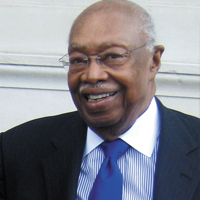 “My dear mother, an uneducated live-in-maid for a wealthy Boston family, always said to me, ‘You are going to college and I want you to be a doctor.’ The oldest son of the family she worked for was going to be a doctor—so her oldest son was going to be a doctor also,” says Eugene Callender concerning his early years. He entered Boston University, majoring in pre-med, but his plans for education were redirected to seminary after a conversation during his sophomore year with his friend, Newell Booth. Newell encouraged Eugene to follow his desire to contribute to the struggle of colored people for equal opportunity by becoming a minister.
“My dear mother, an uneducated live-in-maid for a wealthy Boston family, always said to me, ‘You are going to college and I want you to be a doctor.’ The oldest son of the family she worked for was going to be a doctor—so her oldest son was going to be a doctor also,” says Eugene Callender concerning his early years. He entered Boston University, majoring in pre-med, but his plans for education were redirected to seminary after a conversation during his sophomore year with his friend, Newell Booth. Newell encouraged Eugene to follow his desire to contribute to the struggle of colored people for equal opportunity by becoming a minister.
During Eugene’s time of investigating seminaries, he attended an Inter-Varsity conference where a Harvard student told him about Westminster. He had never heard of Westminster but of all the seminaries he wrote to, Westminster was the only one that neither inquired about his race, nor requested a personal photograph. Due to the non-racial application, he decided that it was the place for him. When Eugene arrived on campus, he entered the lobby where he saw a black man sweeping the carpet. Eugene asked him, “Where do I find the office of the registrar? I am to be a student here.” The man dropped his carpet sweeper and ran. A few moments later, a woman entered the lobby and asked him who he was, so he told her, and she responded, “YOU’RE Eugene Callender!” He answered in the affirmative and she left. Shortly, a kind man came and offered his hand while saying, “I am the registrar, please come into my office.” The encounters in the lobby became more understandable when the registrar informed Eugene that he was to be the first black student at the seminary.
After two weeks of classes, Eugene went to downtown Philadelphia to see the sites and do some thinking. He went to a restaurant on Broad Street and waited for some time as many people came and left. It became obvious that he was not going to be served. This humiliation led to anger at being ignored because of his race. On the train going back to campus, he thought about leaving Westminster. When he returned to the dorm, he visited his friend, Lew Smedes, and told him about the incident. Lew was aghast. At dinner, Lew stood up in the dining room and shared Eugene’s experience with the students. The entire student body, faculty, and some board members went to the restaurant and protested the degrading treatment of Eugene. Dr. Callender comments that, “In the annals of the Civil Rights Movement, let it be noted, that long before there was a sit-in at Selma, a group of students and their faculty from Westminster sat down in a restaurant to address a wrong and attempt to make it right.” That act by the Westminster community made a profound impression on the young seminarian as his classmates empathized with and acted for their brother in Christ.
At graduation, Eugene made contact with the commencement speaker, Rev. Peter Eldersveld of the “Back to God Hour.” One thing led to another, and Eugene became the first non-Dutch, non-white minister in the Christian Reformed Church (CRC) with his ministry being directed to the residents of Harlem. Since Harlem was founded in 1658 as “New Haarlem” by the Dutch, it seems appropriate that the CRC would minister to its black population. Rev. Callender could not ignore the problems and prejudice experienced by the people of Harlem. The vermin-ridden, cold-water apartments were rented at exorbitant rates because the landlords had a captive population due to the segregated society. Harlem was a microcosm of the sordidness of life without God and the defeatism of de facto segregation that arises out of ghetto living. Dr. Callender’s convictions concerning the social implications of the Reformed faith, “motivated my attempt to reach men and women with the good news of hope and justice. And God’s love continues to carry me into a ministry of compassion and love.”
Dr. Callender comments regarding his ministerial education that, “Westminster helped me to see that there are a lot of souls on the modern Jericho roads. Westminster helped me enter into the suffering of others where it hurts. Right now! Right here! To God be the Glory! May we never forget that Jesus deliberately selected a Samaritan in the popular parable.…It did not have to be a Samaritan. Jesus could have chosen a Roman army captain, a Greek stoic teacher, a Jewish prophet, a nephew of Herod, or a playboy from a royal family. But he chose a Samaritan. He must have intended to show that race and class have nothing to do with love and compassion.…That is one of the riches that the Christian community has to offer the world.” Dr. Callender is currently retired and living in New York, but the octogenarian is still active, exercising regularly and ministering as he is able.